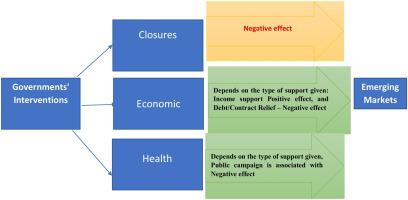Research in International Business and Finance ( IF 6.143 ) Pub Date : 2021-07-09 , DOI: 10.1016/j.ribaf.2021.101492 David Y Aharon 1 , Smadar Siev 1

|
In this study, we explore the impact of government intervention to contain the spread of COVID-19 in emerging countries on the performance of their leading stock indices. We retrieved data on the performance of 25 international capital market indices included in the MSCI Emerging Markets Index and data about the closures, economic, and health measures imposed in each country examined. Overall, our findings show that government restrictions are associated with negative market returns, possibly due to the anticipated adverse effect to the economy. The adverse effect is more evident when closures are imposed. The market response to economic stimulus is mild but varies depending on the type of intervention imposed, much as with the health measures. Public campaigns may raise public awareness about COVID-19, but they can also increase the public’s fear of the pandemic, reflected in the negative response in capital markets. The results are essential for understanding the trends and fluctuations in emerging markets during this current crisis and for preparing for crises in the future.
中文翻译:

COVID-19、政府干预和新兴资本市场表现
在这项研究中,我们探讨了政府干预以遏制 COVID-19 在新兴国家的传播对其主要股票指数表现的影响。我们检索了包含在 MSCI 新兴市场指数中的 25 个国际资本市场指数的表现数据,以及有关每个研究国家实施的关闭、经济和卫生措施的数据。总体而言,我们的研究结果表明,政府限制与负市场回报相关,这可能是由于预期对经济的不利影响。当实施关闭时,不利影响更为明显。市场对经济刺激的反应是温和的,但取决于施加的干预类型,就像卫生措施一样。公共活动可以提高公众对 COVID-19 的认识,但它们也会增加公众对大流行病的恐惧,反映在资本市场的负面反应上。这些结果对于了解当前危机期间新兴市场的趋势和波动以及为未来的危机做准备至关重要。



























 京公网安备 11010802027423号
京公网安备 11010802027423号